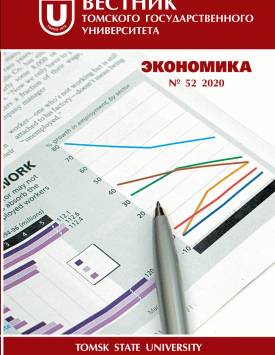The Duality of a University Lecturer Career in the Context of Time Management
The Russian education system is undergoing a radical transformation of scientific and pedagogical activities. The competitiveness of lecturers and higher education depends on the use of scarce resources - time. The size and structure of the time for career depends on the achievement of economic and social goals of lecturers’ lives, their future and place in the complex hierarchy of human relations. In this context, the need to understand the general nature of lecturers’ time contribution to the processes of harmonization of the dual nature of the career increases. The article analyzes the career of scientific and pedagogical workers in the context of the concept of time management. It aims to substantiate the strategic imperatives of career harmonization. The harmony of the career allows improving the quality of lecturers’ working life, increasing the lecturers’ competitive advantage in the labor market. The research is based on the theoretical analysis of the results of research works, which present the main provisions on the architectonics of time for a lecturer career. The article analyzes data on careers of scientific and pedagogical workers in higher education in Novosibirsk for three years. The knowledge of career time allows understanding career duality and evaluating career harmony. The authors have identified and justified a possible strategy for harmonization of scientific and pedagogical workers’ careers. Career harmonization is based on the assessment of the time prospects on the labor market. The authors come to the conclusion that the size and structure of university lecturers’ career time determine the mechanisms of localization and approval of their competitive advantage.
Keywords
higher school,
university lecturer,
career,
career duality,
career time,
career harmony,
career harmonizationAuthors
| Sotnikova Svetlana I. | Novosibirsk State University of Economics and Management | s.i.sotnikova@nsuem.ru |
| Sotnikov Nikita Z. | Novosibirsk State University of Economics and Management | n.z.sotnikov@edu.nsuem.ru |
Всего: 2
References
Сотникова С.И. Новый контур оценки конкурентоспособности научнопедагогических работников: независимая оценка квалификации // Университетское управление: практика и анализ. 2018. Т. 22, № 3. С. 113-126. DOI: https://doi.org/10.15826/umpa.2018.03.031
Беляцкий Н.П. Менеджмент: Деловая карьера. Мн. : Выш. шк., 2001. 302 с.
Романов В.Л. Социальная самоорганизация и государственность. М. : РАГС, 2003. 290 с.
Буравцова Н.В. Современные подходы к карьере и карьеризму // СМАЛЬТА 1. 2014. С. 39-42.
Сотникова С.И. Методологические подходы к исследованию карьеры работника: возможности и ограничения // Вестник НГУЭУ. 2014. № 2. С. 142-154.
Зайцев Г.Г., Черкасская Г.В. Управление деловой карьерой : учеб. пос. для студ. высш. учеб. заведений. М. : Академия, 2007. 256 с.
Кибанов А.Я. Основы управления персоналом : ечебник. 3-е изд., перераб. и доп. М. : ИНФРА-М, 2015. 440 с.
Козлова О.П. Организационно-экономические основы регулирования карьеры научно-педагогических работников высшей школы : дис.. канд. экон. наук. Новосибирск, 2010. 183 с.
Орел А.А., Сидорова Д.Г. Основные факторы, влияющие на развитие карьеры и продвижение по карьерной лестнице // APRIORI. Серия: Гуманитарные науки. 2014. № 2.
Котоманова О.В. Профессиональная карьера как путь личностного развития женщины // Вестник Бурятского государственного университета. 2013. № 5. С. 102-106.
Сотников Н.З. Деловая карьера как механизм формирования конкурентоспособности работников коммерческого банка : дис.. канд. экон. наук. Омск, 2017. 202 с.
Clark S.C. Work/family border theory: A new theory of work/family balance // Human Relations. 2000. Vol. 53. Р. 747-770. DOI: https://doi.org/10.1177/0018726700536001
Greenhaus J.H., Collins K.M., Shaw J.D. The relation between work-family balance and quality of life // Journal of Vocational Behavior. 2003. Vol. 63. Р. 510-531. DOI: https://doi.org/10.1016/s0001-8791(02)00042-8
Grzywacz J.G., Carlson D.S. Conceptualizing work-family balance: implications for practice and research // Advances in Developing Human Resources. 2007. Vol. 9. Р. 455-471. DOI: https://doi.org/10.1177/1523422307305487
Bari D., Robert P. Who Benefits More from a Balanced life? Gender Differences in Work-life Balance and Satisfaction with Life in Eight Post-communist Countries // Intersections: East European Journal of Society and Politics. 2016. Vol. 2. Р. 21-41. DOI: https://doi.org/10.17356/ieejsp.v2i3.195
Baslevent С., Kirmanoglu H. The Impact of Deviations from Desired Hours of Work on the Life Satisfaction of Employees // Social Indicators Research. 2014. Vol. 118. Р. 33-43. DOI: https://doi.org/10.1007/s11205-013-0421-9
Fisher J. Subjective Well-being as Welfare Measure: Concepts and Methodology. 2009. 42 p. URL: http://mpra.ub.uni-muenchen.de/16619
Raibley J. Happiness is not Well-Being // Journal of Happiness Studies. 2012. Vol. 13, № 6. Р. 1105-1129.
Andrews F.M., Robinson J.P. Measures of Subjective Well-Being // Measures of Personality and Social Psychological Attitudes / eds by J.P Robinson, PR. Shaver, L.S. Wrightsman. Academic Press, 1991. Р. 61-114. DOI: 10.1016/b978-0-12-590241- 0.50007-1
Measuring the Global Competitiveness of Michigan’s Workforce. A report to the Michigan Council for Labor & Economic Growth, Global Competitiveness Committee. September 2008. URL: www.milmi.org/admin/uploadedPublications/1468_Global_comp.pdf
Friedman R.A., Tidd S.T., Tsai J.C. What goes around comes around: the impact of personal conflict style on work conflict and stress // The International Journal of Conflict management. 2000. Vol. 11, № 1. Р. 32-55. DOI: https://doi.org/10.1108/eb022834
Сотникова С.И. Приоритеты и тенденции карьерного роста наемного персонала в организации // Вестник Омского университета. Серия: Экономика. 2007. № 2. С. 11-14.
Карпов А.В., Субботина Н.В. Исследование личностных детерминант карьерных предпочтений руководителей // Вестник ЯрГУ. Серия: Гуманитарные науки. 2012. № 4/1 (22/1). С. 77-80.
Сотникова С.И. О карьерном пространстве в российском обществе // Известия Байкальского государственного университета. 2014. № 3. С. 46-52.
Масалова Ю.А. Исследование качественных характеристик профессорскопреподавательского состава российских вузов // Университетское управление: практика и анализ. 2017. Т. 21, № 2 (108). С. 44-52. DOI: https://doi.org/10.15826/umpa.2017.02.019

